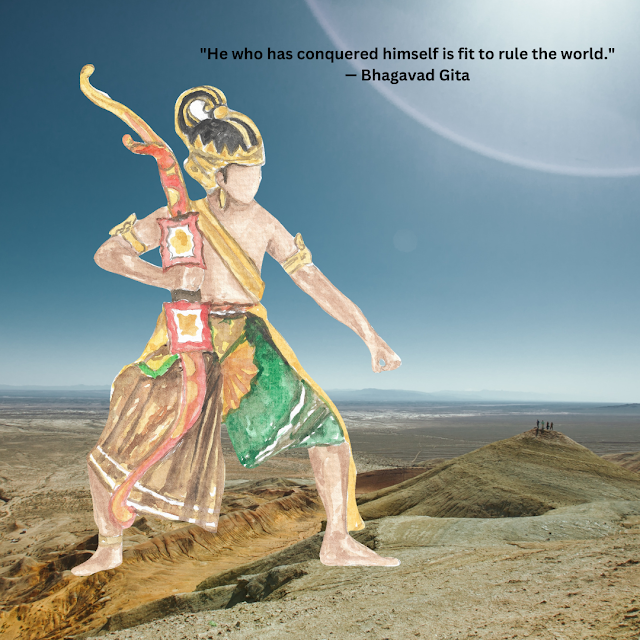
10 'M' that nurtures relationship.
10 'M' that nurtures relationship.
Building a relationship with oneself is crucial before nurturing relationships with others. The Mahabharata, an epic rich with wisdom, offers numerous examples illustrating this principle. One pertinent story is that of Arjuna and his journey of self-discovery and self-relationship during the Bhagavad Gita.
Story from the Mahabharata: Arjuna’s Crisis and Self-Realization
Before the great battle of Kurukshetra, Arjuna, the warrior prince, is faced with a profound moral and emotional crisis. He is overwhelmed by the prospect of fighting against his family, teachers, and friends. Standing on the battlefield, he is paralyzed by doubt and sorrow, questioning the righteousness of the war and his role in it.
Arjuna's Struggle:
Arjuna’s inner turmoil represents a struggle many face: the conflict between duty, ethics, and personal emotions. This internal conflict shows his disconnection from his true self and purpose.
Krishna’s Guidance:
Krishna, his charioteer and friend, begins to counsel Arjuna. Through the discourse of the Bhagavad Gita, Krishna guides Arjuna to understand deeper philosophical and spiritual truths. He teaches Arjuna about:
Self-Knowledge: Understanding one’s true nature (the eternal soul).
Duty (Dharma): Recognizing and performing one's responsibilities without attachment to results.
Detachment: Letting go of selfish desires and the ego.
Meditation: Cultivating a calm and focused mind.
Self-Relationship:
Krishna’s teachings help Arjuna rebuild his relationship with himself. Arjuna learns to look within, understand his true self, and align with his higher purpose. This self-awareness and inner peace equip him to face external challenges with clarity and resolve.
Outcome:
By first resolving his internal conflicts and understanding his own mind and soul, Arjuna gains the strength and clarity needed to act decisively on the battlefield. His journey highlights that before one can effectively engage in external relationships or duties, one must cultivate a strong, harmonious relationship with oneself.
10 'M' that nurtures relationship
- Mutual Respect: Show respect for each other's opinions, boundaries, and differences.
- Mindful Listening : Practice active and attentive listening to understand the other person's perspective.
- Motivate and Encourage: Offer support and encouragement to help each other achieve goals.
- Memorable Moments: Create and cherish shared experiences and special memories.
- Maintain Consistency: Be consistent in your actions and communications to build trust.
- Make Time: Prioritize spending quality time together, even amidst busy schedules.
- Manage Conflicts: Address and resolve conflicts calmly and constructively.
- Mutual Support : Offer help and support, whether emotional, practical, or moral.
- Meaningful Gestures: Show appreciation through thoughtful gestures, like small gifts or notes.
- Meaningful Conversations :Engage in deep and thoughtful discussions to connect on a deeper level.
This story from the Mahabharata underscores the importance of self-relationship. Just as Arjuna needed to understand and align with his true self before leading his brothers into battle, we too must nurture a relationship with ourselves. This internal harmony lays the foundation for healthy, balanced relationships with others.




